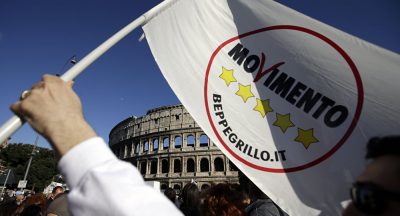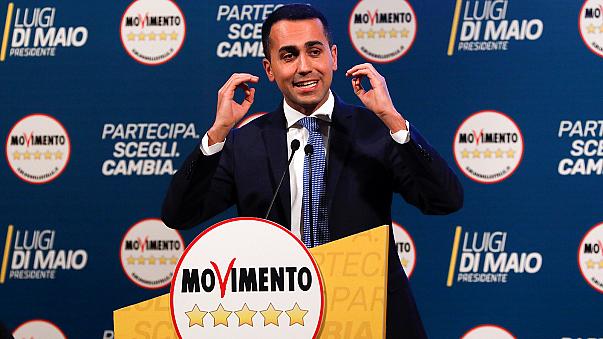|
Italians Leap Into the Political Unknown
|
By Asad Ismi
Global Research, July 02, 2018
|
Url of this article:
https://www.globalresearch.ca/italians-leap-into-the-political-unknown/5646075
|

In a stunning repudiation of both their national political establishment and the European Union, Italians handed two Euroskeptic parties, the Five Star Movement (Movimento Cinque Stelle, M5S) and the League (Lega), a majority of votes in elections held on March 4. The result, which Euronews called “a big shock [to the EU]” and an “earth- quake,” comes two years after Britain’s exit from the EU, to which the Italian vote is being compared.
The populist M5S, led by 31-year-old Luigi di Maio, won 32.7% of the vote (up from 25% in the 2013 election), making it the most popular party in Italy, while the neofascist League got 18% (up from 4% in 2013). Both parties drew support by criticizing the EU’s imposition of economic austerity on Italy and calling for a referendum on the country’s membership in the union. (Both have also since softened their positions on the EU.) But neither the League nor M5S won the 40% of the vote required to form a majority in the Italian parliament, and it was unclear, as the Monitor went to print, whether a coalition would be formed or a new election date set.

Luigi di Maio
The League is part of the centre-right coalition created by three-time prime minister Silvio Berlusconi and his Forza Italia (Go Italy) party. That coalition also includes Fratelli d’Italia (Brothers of Italy), another neofascist party but a relatively newer one with roots in the far-right, post–Second World War Italian Social Movement. The Brothers got 4.3% of the vote and the centre-right coalition altogether took 37%. Berlusconi himself is banned from holding political office due to a fraud conviction.
“The election result was an un- precedented defeat for the Italian pro-European forces,” says Dario Quattromani, professor of political science at Roma Tre University in Rome.
He includes the former ruling centre-left Democratic Party (PD) of Matteo Renzi (who resigned as leader after his party’s clobbering at the polls) and Berlusconi’s Forza Italia in that category.
“[These parties] regis- tered a diffuse sense of distance and disillusion coming from their usual voters.”
Italians blame the country’s massive unemployment rate ( just under 11% in early April, but around 32% for youth) and poverty in part on budget cuts enforced by an austerity-obsessed EU. Italy’s statistics office estimated 4.7 million Italians (8% of the popula- tion) lived in absolute poverty in 2016, with most of them concentrated in the south of the country. Another 30% of Italians are at risk of poverty.
The Italian economy experienced only a weak recovery after the 2008 recession and is hobbled by debt equivalent to 131% of the country’s GDP. According to Mario Pianta, an economics professor also at Roma Tre University,
“20 years of stagnation and decline mean a generation with ever-lower expectations in terms of income, work and life.”
Membership in the euro has “clearly been a factor in explaining the rise of populism in Italy,” wrote Guardian(U.K.) economics editor Larry Elliot in a March column, “because it has made it impossible for governments in Rome to restore competitiveness by devaluing the currency — some- thing they did on a regular basis in the days before monetary union. The disciplines of euro membership have resulted in slower growth, stagnant wages, high unemployment and aus- terity — perfect conditions for the Five Star Movement to exploit.”
It’s not surprising, in this economic context, that M5S’s election guarantee of a monthly basic income for the poor and unemployed met with resounding approval in Italy’s south, which is poorer than the north and middle of the country, where most industry is concentrated. The M5S won almost all its votes in the south whereas the League attracted the support of richer northern Italians with its promise of a flat tax on income.
Fearmongering about immigration
The issue of immigration was a politi- cal boon for the League, whose leader and candidates exploited public fears, notably of unemployment, to the max. About 600,000 migrants, most of them from Libya, have entered Italy in the past five years. Since, under EU rules, migrants to the continent must be processed in their country of arrival, the issue provided more fire, alongside austerity fatigue, for the anti-EU vote. Matteo Salvini, the League’s leader, has vowed to raze Roma camps and claims that Italian society is threatened by Islam.
“We are under attack. Our culture, society, tradi- tions and way of life are at risk,” Salvini stated in January, promising to deport 500,000 people and stop the migrant “invasion.”
Even more reprehensible is Salvini’s remark that Italy needs a “mass cleansing, street by street, neighborhood by neighborhood.” When earlier this year a right-wing terrorist shot and injured six African migrants in a drive-by shooting in the town of Macerata in central Italy, the poli- tician blamed the victims. Meanwhile, Salvini has praised how things were run under Mussolini’s dictatorship.
The Five Star Movement combines leftist and rightist positions. Like the League, it is anti-immigrant and calls for deportations, but its leaders are less strident on the issue and more critical of European and U.S. imperialism, which they blame for the exodus.
“One of the most telling critiques that the Five Star Move- ment aimed at the Democratic Party was that the latter supported the overthrow of the Libyan government and the consequent collapse of Libya as a functioning nation,” says Conn Hallinan, an analyst with Foreign Policy in Focus. “Most of the immigrants headed for Italy come from, or through, Libya.”
The NATO-led military attack on Libya in March 2011, which was backed by Italy and the EU, essentially destroyed the North African country. Libya remains mired in chaos and civil war seven years later. Hallinan adds that Renzi and his PD party never challenged the EU or NATO on their wars in Afghanistan, Yemen, Somalia and Syria, “wars that fuel millions of immigrants.”
Instead, the EU chose to give Turkey €6 billion ($9.4 billion) to stop immigrants from coming to Europe. This situation provided the Italian neofascists with a crucial issue to exploit, raising them from marginal status to national powerbrokers in Italy and beyond.
The centre is not holding
The collapse or marked decline of the centre-left in Italy and the rise of anti-establishment and right-wing parties follows a European trend, as seen in recent elections in Germany, France and the Netherlands. But, according to Hallinan, this does not indicate that European voters are necessarily moving to the right.
“When center-left parties embraced socially progressive policies, voters supported them,” he points out. In Portugal, two leftist parties formed a coalition with the Social Demo- crats to lower the jobless rate and end many of the austerity measures enforced on the country by the EU. In recent local elections, voters gave them “a ringing endorsement,” Hallinan notes.
Jeremy Corbyn took the British Labour Party to the left with a program to renationalize railroads, water, energy and the postal service, improving Labour’s polling numbers in the process (the party has been neck-and-neck with the Conservatives for over a year). Polls also show public approval of Labour’s plan to support green energy, enhance the National Health Service, and fund education and public works.
Whether the M5S can attain power and lead Italy in a progressive direction remains to be seen, but the party has already softened its criticism of the EU considerably. Di Maio declared after the election,
“It’s not time to leave the euro anymore and the Movement doesn’t plan to exit the European Union.” He also stated that the M5S “does not want to have anything to do with Europe’s extremist parties,” and desires “maximum dialogue with European government forces.”
Simona Guerra, an associate professor of politics at the University of Leicester, U.K., explains that the M5S has lim- ited options with respect to eurozone membership, since Article 75 of the Italian constitution prohibits the use of ref- erenda in the authorization or ratification of international treaties. In any case, she says, the movement’s attitude on such matters “can be best described as ‘Euroalternativism,’ a pro-systemic opposition to the EU integration process, supporting the EU, but willing to change the direction of the integration process itself.”
This desire to work from the inside to change the EU will most likely limit M5S’s progressive options. It could also disillusion M5S supporters who voted for an anti-es- tablishment party, thus opening political space for what Guerra calls an “anti-anti party.”
Could the Potere al Popolo party (Power to the People) fit that description? The PaP took 0.95% of the votes in the March election — not enough for a seat in parliament, but a promising start, according to the party’s 37-year-old spokes- person, Viola Carofalo. Potere al Popolo was launched three months before the election as an anti-capitalist, communist, socialist, feminist and pro-immigrant party, and draws much of its support from young voters, mainly in the south of Italy.
“What we desperately need in Italy is a political renewal, and this necessarily means a politics led by the young, by women, by people of colour, by diversely abled people, by people who are in politics because they believe in change and not because it has become a career,” Carofalo told Jacobin magazine in March.
Accused by some of splitting the left vote, Carofalo claims her party’s priority is not, primarily, elections, “but rather getting people to participate in politics and in rebuilding communities, in rebuilding solidarity within our society.” She says Potere al Popolo is making links with similar groups across Europe, including France Insoumise and Podemos (in Spain), who are seizing power back from “career politicians,” including those on the traditional left.
The message may sound as populist as anything the League or M5S put out, but, as they say, “When in Rome….” Carofalo and other European progressives are struggling to grasp the enormity of the challenge at hand. Rather than mourning the “death of liberal democracy,” as so many mainstream columnists have been of late, these new left leaders are engaged in the hard work of building solidarity across classes, generations and cultures.
*
This article was also published by The Canadian Centre for Policy Alternatives.
Asad Ismi covers international affairs for the CCPA Monitor where this article was originally published. He has written extensively on Asian geopolitics. For his publications visit www.asadismi.info.
Asad Ismi is a frequent contributor to Global Research.
|
|
Disclaimer: The contents of this article are of sole responsibility of the author(s). The Centre for Research on Globalization will not be responsible for any inaccurate or incorrect statement in this article.
|
|
|
|